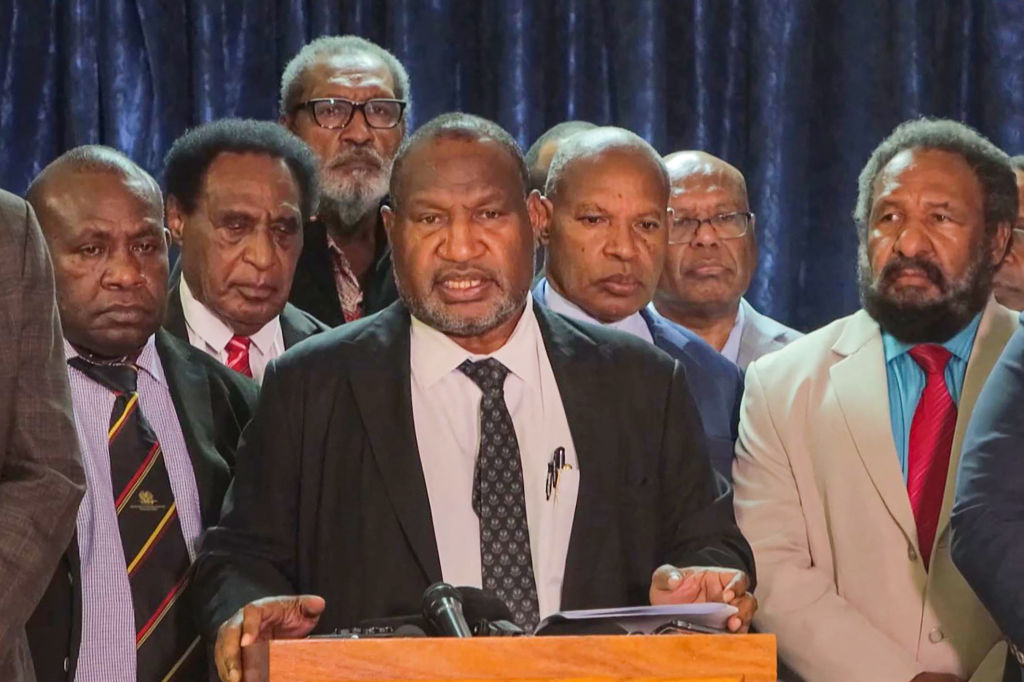Papua New Guinea’s turmoil isn’t over. A vote of no confidence hangs over Prime Minister James Marape, with an imminent challenge to his position expected on the floor of parliament. It comes just over a fortnight after riots shook the capital on 10 January – dubbed Black Wednesday – which saw major retail shops looted and burnt across Port Moresby.
At the heart of this mayhem is increasing unemployment and reduced purchasing power of individual households. A protest from police over underpayment was later revealed to be a glitch in the public servants’ payroll system. These actions left the city vulnerable to opportunists and it is estimated that more than 3,000 people lost their jobs as a consequence of the unrest.
When and where will the jobs for decent pay come from to alleviate pressure on the average Papua New Guinean? The informal economy regularly fares poorly. Representing up to 80 per cent of the population who are largely subsistence farmers, it is underutilised as a true source of wealth generation for the country. Of a population around 10 million plus, about 270,000 are formally employed, and those “lucky” ones will earn at minimum, K280 (A$120.00) per fortnight. That is not a sustainable income in a country stricken by increased cost-of-living pressures.
Responding to the riots and unemployment crisis, Marape called for unemployed youths or those who have dropped out of school to register at designated institutions – churches, provincial or district administrations – in a bid to find work or education placements. But there are simply not enough jobs in PNG with a decent income above the national minimum wage of K3.50 (A$1.40) per hour nor enough quality training institutions to absorb them.

The country’s aspirations under its Vision 2050 aim to achieve a “Smart, Wise, Fair, Healthy and Happy Society by 2050”. This will not be realised if the majority of its people continue to miss out on quality education that will equip them to secure decent jobs above the minimum wage. The immediate opportunity lies in offering jobs that seek to leverage the Pacific Australia Labour Mobility (PALM) program – short term contracts and Recognised Seasonal Employer (RSE) schemes facilitated through the Labour Mobility Unit.
Under PALM and RSE, there is no pathway for permanent migration. They aim to achieve three things: first, grow the financial power of individuals involved; second, fill the labour shortages of employers and grow their businesses; third, grow the economies of the participating countries. It is a triple win by design that aspires to achieve economic growth for all parties. These short-terms jobs restricted to horticulture and viticulture may be viewed as “blackbirding”, but the point of difference is in the power of choice to decide where and how a person will earn decent pay, which can be as much as 19 times more than PNG’s minimum wage. Employers have the facility to pay limited upfront overseas travel costs that are reimbursable through deductions from the employees’ income over the period of employment.
The challenge is administering this opportunity within PNG’s existing decentralised structure of labour mobility through “recruitment hubs” and guaranteeing a trusted reliable workforce for the employers. Equally important is managing and maximising this exposure to mechanised farming practices for mass production and using that knowledge to tailor and enhance PNG’s own traditional farming practices to access competitive international markets. Despite the criticisms of decentralisation in PNG linked to political patronage and favouritism, when well implemented, it can generate equitable service delivery to constituents.
There are other employment opportunities to Australia such as the working holiday maker visa, temporary skill shortage visa and newly instigated Pacific Engagement Visa. These are not restricted to a hub arrangement, which simply means any eligible Papua New Guinean who can afford it and show proof of a job offer in Australia can apply.
If the PNG government is serious about giving decent jobs to its people, then it must enable them to be passport-ready and in doing so increase their opportunity for overseas jobs. This means investing in agencies and service providers to be located in each of the four regions (Southern, Highlands, Momase and New Guinea islands) to capture all 97 districts and 22 provinces.
Practical steps include upgrading the printing capacity required to mass print both national identification birth certificates and cards within two weeks. The same is required for the agency responsible for issuing passports within a 15-day turnaround. Issuance of police clearances also requires similar upgrades at ten days turnaround. Each of these agencies must be adequately staffed and operated efficiently, unaffected by power disruptions or limited toner supplies.
Australia can support more, by similarly increasing the number of medical panel physicians and biometric collection centres, enabling increased access for work-related visas.
These are practical steps aimed at generating simultaneous scale and equitable access to more overseas jobs. Without supporting the infrastructure that will lead to a large-scale effort to boost PNG’s chances of securing increased decent overseas jobs, economic pressures on the average Papua New Guinean household will linger, and with it the problem of increased law and order issues.


